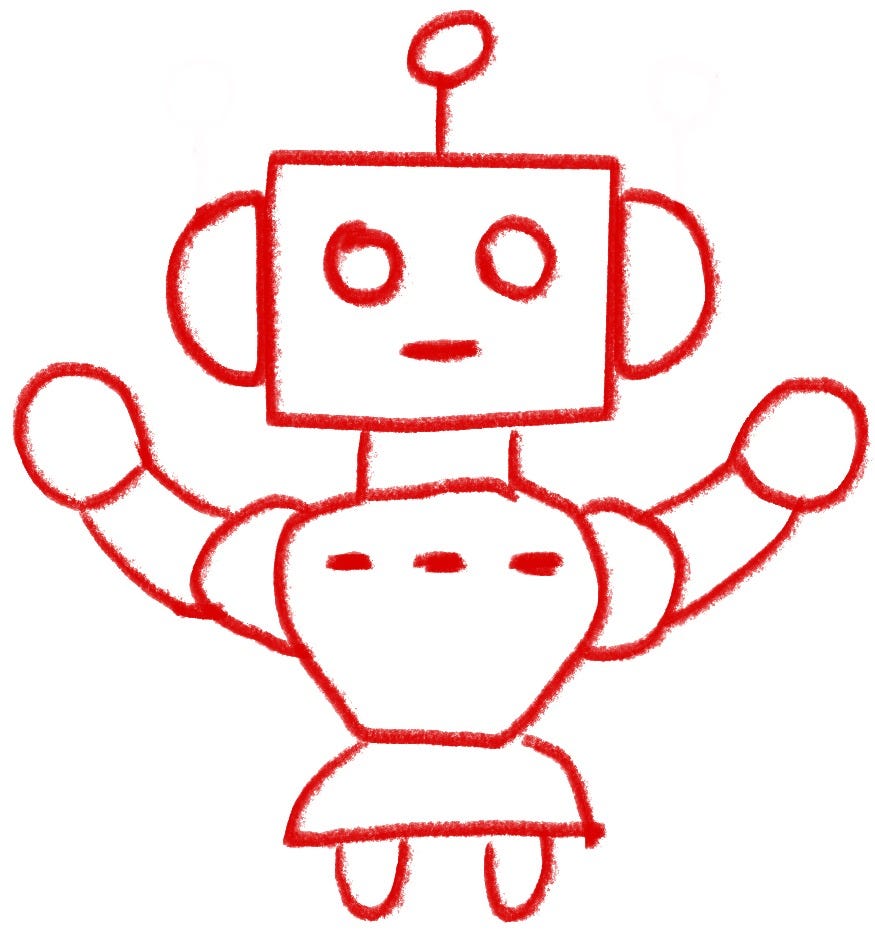Artificial Intelligence & The Midas Touch
The knock-on effect of AI that no one is talking about
To gild refined gold, to paint the lily
To throw a perfume on the violet
To smooth the ice, or add another hue
Unto the rainbow, or with taper-light
To seek the beauteous eye of heaven to garnish,
Is wasteful and ridiculous excess.
— William Shakespeare
His Name Is Midas
In the ancient tale Metamorphoses, Ovid tells the story of a king who was given one wish from the gods.
The king’s name was Midas and he requested that anything he touched be turned to gold. The king’s wish was granted and he then spent his day alchemizing the various accouterments of his palace: the columns, the clothes, the tables, the trees, the plants. He basked in the glory of his treasures and relished in the power he had to create wealth from virtually anything.
His joy was cut short, however, when he discovered that food turned to metal in his mouth. Dish after dish, course after course, each meal was rendered inedible by the king’s new ability. This continued for days and the princess became so overwhelmed that she embraced her father in an attempt to comfort him. To everyone’s dismay, the princess was instantly transformed into a lifeless, golden statue.
King of Commodification
As a child, the image of a frail and withered king clutching the gold-plated torso of his lifeless daughter left an indelible impression on me. Yet, in popular culture, the Midas Touch means something very different. It is a high compliment — an endearing descriptor of someone who has established a reliable reputation for success and money-making.
With his gift of transforming raw resources into profit-generating product, I have often thought that Midas could be the patron saint of entrepreneurs, creators, and business owners. After all, these individuals are the modern Midas’s looking to imbue everyday materials with economic value and monetary surplus. Surely, you can picture the dollar signs in the eyes of Midas’ servants every time he brushed up against a flower, trinket, or miscellany. No judgment there, of course. Entrepreneurship is a gift that should be used to enrich the world and provide economic security for the community. If the Midas dynasty played their cards right, it would only be a matter of time before silver and gold became as common as stones.
Tech and AI
In recent years, the great hand of Midas has hovered over a particular corner of the tech industry, generously bestowing a tap on the shoulder of firms and startups that incorporate artificial intelligence into their offerings. Big Tech companies have suggested that their capital expenditure is projected to reach $1 trillion in the next four years — and that’s just on the data centers. Last week, AI giant NVIDIA purchased a small software company called Run:AI for $700 million but barely made headlines. Apparently, even a nine figure acquisition has become banal to this booming sector.
The question of whether or not these companies can conjure a worthy product from such steep investment is, perhaps, one of the most important questions of 2025. Optimists like Conor Grennan, Chief AI Architect at NYU Stern, certainly thinks so.
another professor from NYU (I know — I need to branch out) is much more truculent. Either way, good money has followed ostensibly good money into these AI firms, and the future of non-AI work has become the subject of hot debate. As I’ve been pondering my own thoughts on the topic, the Midas story came to mind.Sam Altman and Company
One data point came from Sam Altman, CEO and founder of OpenAI. When asked about potential careers that AI might make available (or obsolete) and how someone should position themselves to exploit the evolving landscape, Altman has said:
"I don't know what job titles will be and I don't know if we will get there in 5 years. But I think there will be a premium on human, in person, fantastic experiences."
This is an opinion that a lot of people seem to hold.
Nvidia’s Jenson Huang has said that as we become more and more reliant on AI agents, an education in the humanities is going to become increasingly valuable. Consultants and Linkedin voices are suggesting that soft skills and people-orientedness are going to be key differentiators in the new age — i.e. think about how nice it is to get a human representative on the phone rather than a voice system, and then copy-paste that to everything. I have spied a few Substack Notes suggesting that a flood of AI-generated copy will result in hoards of paying subscribers flocking into the soft lines of human authors. And if the predictions of multiple cultural pundits are any indication, then we are going to see a major uptick in IRL experiences this year: speed dating, look-alike contests, no-phone club nights, and more.
The logic for these assertions is that AI is going to become as ubiquitous as electricity; adopted by a majority of companies and creators because of how cheap and efficient it is compared to human-based service. This makes products made exclusively by people scarcer, which drives up demand and grants pricing power to those who stay in the human-made business. However, by going the human route, companies or creators are required to charge above average prices in order to recoup the higher costs, provided that they can make a quality enough product to keep up with the machine. This essentially makes human goods a new luxury commodity.
Said differently: human-based will get the Midas treatment.
Agriculture and Transformation
Precedent for this type of transformation can be seen in the farming sector, summed up surprisingly well by some marketing lingo I saw on an egg carton:
“Growing up, we didn’t have organic. We just called it farming.” -- Random Farmer
For most of human history, every farmer had roughly the same relationship to their farm as their fathers did. Yet, in the mid-1900’s, a new method of industrial farming began to emerge. This new methodology used synthetically-made pesticides, hormones, and antibiotics to produce cheaper, bigger, and more lucrative products. As this new method became more popular, the traditional method of natural farming became more expensive and harder to sustain. The practice which had been familiar to humans for millennia was relegated into a specialized and institutionally-certified class known as “organic.” The result? Lots of food-- which is great. But if you want to purchase something that was grown without the use of modern tech (the natural way), you are going to pay a premium.
The Trade-Offs
As a student of business, I appreciate how much value is created by the efficiency of markets and the boldness of entrepreneurs. I also know what it's like to try and market to the long tail of the distribution. Technologically speaking, there is no time I’d rather be living in than now. For instance, I see the promise in Google’s use of AI with Deepmind and feel utterly amazed at the possibilities. Despite the rabble rousing that I do around tech, I genuinely love modern innovation and I love seeing companies in action.
But… I also know a bribe when I see one.
The suggestion that being a humanist is good in the age of AI because being a humanist will be profitable is very compelling— it is also, ironically, very anti humanist.
I agree that there will always be a market for non-AI goods and services. I am not necessarily making an argument for pausing AI implementation either. Rather, I am suggesting that we need to think carefully about how the proliferation of AI might inadvertently cause us to lose sight of what makes human-centric activity truly meaningful — what it means to try and constantly appraise the value of presence, cognition, and human concern. The overwhelming testimony of ancient traditions suggests that some things — even free things — are cheapened by a price tag. The wisdom of Midas is that he teaches us to think twice about what we commodify. He reminds us that some things are not meant to be gilded.
The industrialization of agriculture, for instance, has had mixed effects for this very reason. While the efficiency of food production has led to abundance, it has also degraded nutrition and taken a toll on the environment. Now the more human-based and healthy product is scarce, available only for those fortunate enough to have a higher income — a challenge, no doubt, that the first industrial farmers thought they’d be solving rather than amplifying. Like Midas, who rendered his own food expensively inedible, we have hampered our own subsistence in the name of progress.
A more sophisticated example can be seen by assessing our attention.
, in his book The World Beyond Your Head, uses the example of an airport to demonstrate how the attention economy has altered our relationship to silence and focus:has a compelling take on whether or not it's valid to call attention a resource, but the overarching point still stands: to commodify something is not its preservation, but its transformation. And in the case of certain human trademarks, commodification can easily be its destruction.“Silence has become a luxury good. The only quiet, distraction-free place in the airport is the business-class lounge, where all you hear is the occasional tinkling of a spoon against china. The people in there value their silence very highly. If you’re in that lounge you can use the time to think creative, playful thoughts. You could come up with some brilliant marketing scheme that you would then use to determine the character of the peon section. You can think of it as a transfer of wealth. Attention is a resource, convertible into actual money.”
Attention and Adolescence
Most gruesome of these has been the arbitrage that social media companies have done with childhood. If you haven’t seen the damning evidence this week from Jonathan Haidt on
regarding Tiktok’s knowledge of the widespread harms caused by their app, you need to. These companies are doing nothing less than robbing children and teens of their formative years, pulverizing their mental health, and trading it for shareholder value. This is a crystal clear example — in real time — of the Midas Touch gone wrong. And just like the story, the next generation is the greatest casualty.Lucky for us, not all is lost. I am hopeful, and expectant, that our culture’s story will turn out better than that of Midas; and there is still time to learn from his example. In some versions of the story, the broken and distraught Midas begs the gods to reverse his wish — and they commanded him to bathe in a nearby river. After washing himself free, he takes his daughter into the same river and revives her.
Conclusion
I will leave you with two quotes that, I think, encapsulate the spirit of what I am trying to communicate. Ivan Illich, one of my intellectual heroes, said the following:
What people do or make, but will not or cannot put up for sale, is as immeasurable and as invaluable for the economy as the oxygen they breathe.
Ezra Pound, respectfully, put it even more eloquently:
The temple is holy because it is not for sale.
Thanks for reading, friends. Please leave a comment, like, and share with someone you know! I expect to be back next week with a fresh newsletter.
Curiously yours,
Bradley
P.S. — Click here for a song, related to today’s newsletter, that is guaranteed to make one of your playlists.








